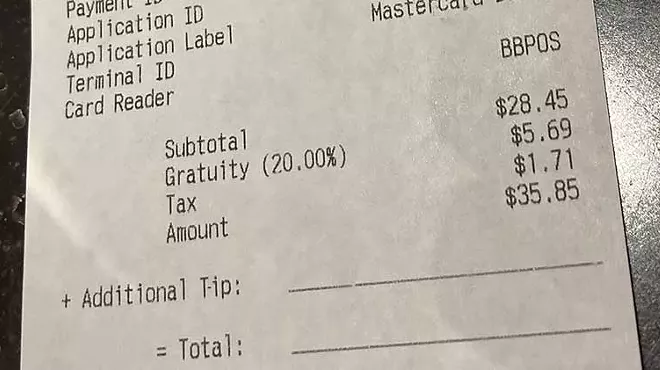Why everyone should wait tables and tend bars
It can teach things about human nature and how to get along with people outside the cozy confines of our own social circles

Audio By Carbonatix
[
{
"name": "GPT - Leaderboard - Inline - Content",
"component": "35519556",
"insertPoint": "5th",
"startingPoint": "3",
"requiredCountToDisplay": "3",
"maxInsertions": 100,
"adList": [
{
"adPreset": "LeaderboardInline"
}
]
}
]

Chowhound is a weekly column about what’s trending in Detroit food culture. Tips: eat@metrotimes.com.
Earn while you learn: Last week’s reader contributor, Laura Buus of Berkley, was a little late in forwarding me some bio info I’d intended to attach to her questions on what’s up with service charges, tip pools, and such. Once she did share a little of her backstory, post-deadline, it reminded that there’s something more to be said for time served in the hospitality trades; and, perhaps, food and beverage specifically.
In the late ’70s, as a 19-year-old server at the former Royal Touch on 15 Mile and Groesbeck (thanks for forwarding the Polaroid, Laura), Buus pocketed some priceless pearls of wisdom while waiting tables for tips. Recalling two regulars, she reflected:
“One was a good-looking non-tipper and the other was not so good looking but a great tipper.” Buus admittedly wasted too much time trying to make an impression at the former’s table before realizing her bread was only getting buttered at the latter’s. Laura also learned the lesson of walking a few miles in someone else’s work shoes. “…When I complained to the cooks [over waits for orders, food quality, appearance, etc.], they told me to learn to cook so I did. That didn’t last long because the work was harder and paid less. It changed my tune.”
After doing the math on what kind of a living waitressing would likely afford her long-term, Buss decided to work her way through college instead. She’s become an international tax specialist, a career she says she’s loved. Still, she credits her days of dining room duty with skill sets she continues to employ both professionally and personally, citing organizational, multitasking, and a focused, personable approach to people that she offers everyone from clients and prospective clients to friends and family alike. And recalling one customer from her past in particular, Buus, apparently makes it a point to never forget a face.
“One customer at Denny’s [another Buus stop along the way] looked familiar. It took a while but I recognized him as a guy who used to go through the drive-thru at Jack In The Box where I had worked before and masturbate when he pulled up to the window.” Chowhound readers may recall another recent contributor, Erica Pietrzyk, who had her own jerk-off to deal with. I don’t know what surprises me more; reports that guys with way too much time on their hands are out there bopping their bolognas, or that masturbation’s been a thing as far back as the 1970s. Who knew?
As someone with some history in the business, Buus, purely a restaurant-goer 40-plus years later, sees how times have changed in the industry as a workplace.
“We had to pass a written test before we could work the floor, we knew the menu inside and out,” she says. “What frustrates me now is when I ask a question and they don’t know the answer and I have to actually ask them to find out.” I would agree, Laura. Generally speaking, the premium placed on preparing hospitality employees for success doesn’t appear to be what it once was. And this increasing lack of service-focused, instructional and informational support from employers, combined with the youthful, nominally experienced and socially insecure/awkward workforce customer service trades traditionally attracts, tends to render predictably lackluster results. More and more, it amazes me how restaurants are content to deliver sub-perfunctory service in their dining rooms. Fine dining is still a notable exception, where proprietors know they need to deliver high-priced value perceptions. Yet I digress. Let’s accentuate the positive here.
I’ll second what Laura Buus has to say about the real value of time spent working in the restaurant business. It can teach things about human nature and how to get along with people outside the cozy confines of our own social circles. Anyone who plans to make their way in the real world might do well to serve a stint in food and beverage. You’ll practice the social graces and get ahead of the game making great impressions through simple manners. You’ll gain confidence in your conversational skills; learning how and how not to establish trust and rapport with strangers, while honing powers of persuasion and strengths of personality. You’ll find you’ve more of an ability to think on your feet, budget your time, and juggle demands on your time and attention by getting stretched in all those areas. And you’ll start to see a social animal in you that’s a bigger dog or more clever kitty than you’d ever previously unleashed to the world. And you’ll be proud of those accomplishments, for what they’ll prove worth to your self-esteem and future efforts at whatever you choose to do or become.
Let me be clear: I’m not advocating careers in waiting tables and bartending. But I do believe good, honest restaurant work builds character traits that can serve a person well past their days of taking care of people looking to be well-fed and watered. Whenever I try to sum up what it takes to do that while reaping the truest rewards, I’m reminded of what one of my mentors Rich Huie (longtime owner of Scottsdale’s Salt Cellar lobster house) taught me about what’s true of making a living in the restaurant business:
“Not everybody’s just happy to eat out. Once they hit the door, the expectation meter’s running. They’re hungry for sure, and maybe had a hard day to boot,” Huie explained, defining “hangry” for me two decades before anyone coined the term. “The game is to feed that bear before the bear eats you. Get ‘em that first drink right away. Don’t be slow on the second. The first goes fast. That’s what this business is about: getting bears to eat from your hand.”
I’ll close with this, from another foodie philosopher whose reputation and perspectives I also subscribe to:
“The things taught in colleges and universities are not an education but the means to an education.” —Ralph Waldo Emerson (who worked his way through Harvard by waiting tables).
Subscribe to Metro Times newsletters.
Follow us: Google News | NewsBreak | Reddit | Instagram | Facebook | Twitter







